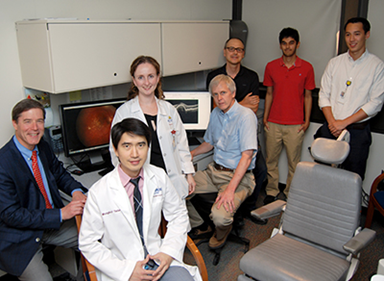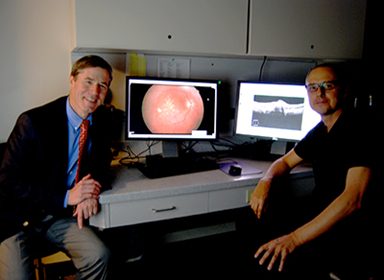Press Release
Johns Hopkins APL, Wilmer Eye Institute to Develop Tools to Detect Age-Related Macular Degeneration
Research Team Zeroes in on Earliest Stages of Blinding Retinal Disease

The Johns Hopkins University Applied Physics Laboratory (APL) and the Johns Hopkins Wilmer Eye Institute have received a grant from the National Institutes of Health to develop image analysis and machine-learning tools to detect age-related macular degeneration.
Age-related macular degeneration (AMD) causes lesions that blur the sharp, central vision individuals need for “straight ahead” activities such as reading, recognizing faces and driving. It affects the macula, the center part of the retina (the light-sensitive tissue that lines the back wall of the eye) that allows individuals to see fine detail.
“Left untreated, AMD is the number one cause of blindness for individuals over 50,” said APL’s Philippe Burlina, a co-principal investigator for the project. Typically, much of the vision loss from AMD is irreversible, prompting the need to detect treatable lesions before substantial vision loss has occurred, he explained.
Burlina and APL colleague David Freund have been working on this problem for several years. A while back, they consulted with Dr. Neil Bressler, chief of the Retina Division at the Wilmer Eye Institute, who expressed the need for an automated way to diagnose AMD in its earliest stages.
“It can be very difficult to identify who may be at risk for AMD-related vision loss because AMD has no impact on other parts of the body,” said Bressler, who is a co-principal investigator on the project. “And the earlier stage of AMD, when one wants to detect the condition, typically is not associated with any symptoms of vision loss.”
Bressler added that progress on such a system has been limited. “And there may not be enough skilled observers like optometrists or ophthalmologists to scan the population at risk, for example, the tens of millions of people in the U.S. over the age of 50,” he said. “One thing that is needed is automated detection of the earlier stages of AMD that are easily accessible, something akin to blood pressure monitors located in pharmacies.”

Burlina and Freund, along with APL’s Srihari Kankanahalli, Albert Feeny and Neil Joshi, are collaborating with Bressler and his Wilmer colleagues, Drs. Yulia Wolfson, Mongkol Tadarati and Kátia Delalibera Pacheco. Utilizing the Age Related Eye Disease Study (AREDS) database — NIH medical records of 4,757 participants in a 10-year study of AMD — the team is working to develop algorithms robust enough to be used on millions of individuals.
The team is analyzing images and incorporating other information included in medical records — such as co-occurring pathologies, demographics, lifestyle and hospitalization history — to improve detection performance.
The ultimate goal is to identify the estimated 8 million people with the earlier stages of AMD — among the tens of millions of Americans over the age of 50 who are at risk — and refer them to a practitioner who can monitor those individuals for the onset of the more advanced stage when prompt treatment is indicated to reduce the risk of blindness.
Alan Ravitz, manager of APL’s new National Health Program Area, says this effort illustrates the ways the Laboratory is applying its vast scientific and systems engineering expertise to national health challenges. “APL has been leveraging machine-learning techniques across all of our mission areas — from missile defense, to homeland security, to space exploration,” Ravitz said. “We are excited about applying that expertise to health-care-related challenges such as macular degeneration.”